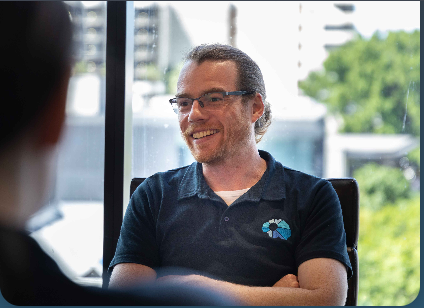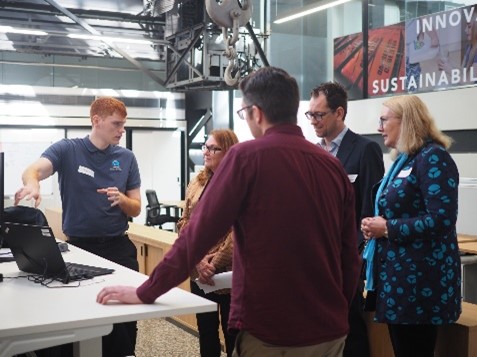Paul Ramsay Foundation’s $5m boost to data social enterprise set to create more jobs for neurodivergent people

A significant expansion in career pathways for neurodivergent people in data and engineering is set to open following a $5 million boost to one of Australia’s fastest growing work-integration social enterprises from philanthropy.
The Paul Ramsay Foundation (PRF) announced this week that it would partner with Australian Spatial Analytics (ASA) to provide a blended finance package incorporating $2.5 million in grant funding and $2.5 million in impact investment to the social enterprise’s national scaling plans.
ASA is a spatial and data analytics company that is committed to creating inclusive and safe workplaces for neurodivergent people, of which 80% of its team identify. ASA helps solve Australia’s skills shortages and data sovereignty concerns by accessing an untapped pool of talented and motivated people who perform essential work that otherwise occurs offshore.
Young neurodivergent people face an unemployment rate of 34%, with hiring and interview barriers representing a common challenge to securing meaningful and ongoing employment. ASA’s team works with people to employ their specialised cognitive talents, such as pattern recognition and memory retention, and pairs them with a role to deliver high-quality spatial data services to a range of clients in the public and private sector.
Australian Spatial Analytics CEO Geoff Smith said the funding would support significant growth of the “strength-based” social enterprise, which has so far provided career pathways for more than 150 young neurodivergent adults who may otherwise be unemployed.
“This blended finance partnership is monumental for ASA and the work-integrated social enterprise sector,” he said.
“It shows that with some tailored support, social enterprises like ASA can mature past the grant cycle and create systemic impact over the long term. ASA is proud to be a case study for this innovative approach.”
PRF’s Head of Employment Josephine Khalil said ASA was a strong example of social enterprises’ ability to address key social issues, such as meaningful employment for people with disability, while also tackling national dilemmas like skills shortages.
“Impact investing is one of our key tools, alongside traditional grant-making, for building stronger social enterprises and driving greater impact in Australia,” she said. “ASA has built a successful business that exists to create jobs and an environment that enables its young people to thrive. We’re proud to partner with them in this new model to help unlock more opportunities for neurodivergent people, and to create a more dynamic and inclusive Australian labour market.”
This new funding partnership model prioritises long-term sustainability and self-sufficiency for social enterprises. ASA will use the capital to increase its impact across Australia, facilitating the employment of more than 100 young autistic and neurodivergent adults across five locations and providing alternative career pathways into industries with critical skills shortages.
The establishment of ASA was a flagship project of social enterprise incubator White Box Enterprises, which is itself supported by philanthropy. White Box Enterprises has a team of seasoned social entrepreneurs experienced in taking a business concept from ideation to maturity, eventually “backing away” once the infrastructure is in place, a CEO and board established and the enterprise is running smoothly.
White Box is currently nurturing a varied portfolio of start-ups that focus on two key elements – an untapped market opportunity, and the skills and needs of individuals who are often overlooked by the mainstream job environment. CEO Luke Terry says the $5 million backing for ASA is a phenomenal boost that will deliver many more job opportunities for neurodivergent people who “have been overlooked by traditional employers for too long”.
“We’re very excited for the next phase of growth for ASA, which has quickly developed into a sophisticated business delivering real results. Apart from the client satisfaction and outstanding work it’s producing, the social benefits and personal stories of employees who have finally found job satisfaction and a workplace that recognises their strengths, are the most uplifting outcomes of all.”
The partnership comes amid a growing government focus on the area, including the recent white paper, Working Future, and the final report from the Royal Commission into Violence, Abuse, Neglect and Exploitation of People with Disability.
Anthony Porter – From disability support pension to Lead Data Analyst

Anthony started as a Junior Data Analyst in our Brisbane office. Working at ASA has provided him with an opportunity to gain new skills and experience in a professional environment. This was his first job, starting as a casual working on a disability support pension. He now works full-time, leading projects and interacting with clients daily.
“I started at ASA over two years ago with no previous work experience. Since then, I have grown a lot, thanks to the environment and support of ASA. Over the past two years, I have gained many technical, social, leadership, and management skills. Thanks to the opportunities provided by ASA, I’m now a Lead Data Analyst and Project Manager in ASA’s digital engineering space, continuing to grow and gain new skills.”